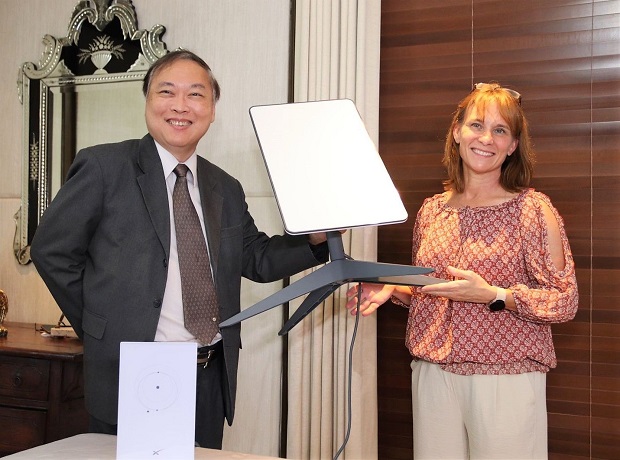Department of Information and Communications Technology (DICT) secretary Ivan John E. Uy made a glowing endorsement of the Starlink satellite broadband service during a joint press briefing with US tech firm SpaceX on Wednesday, July 27, at the Manila Hotel.
Slated to be rolled out later this year in the Philippines, Starlink is a satellite Internet constellation operated by SpaceX in about 40 countries. The Philippines is set to be the first country in Southeast Asia to experience Starlink’s services.
The satellite Internet offering boasts speeds of up to 200 Mpbs but its subscription price is rather pricey at P5,500 per month.
Nonetheless, the DICT chief said Starlink is expected to connect rural and remote communities where connectivity is unreliable or completely unavailable. Through this service, he said Filipinos from remote areas can have access to education, health services, and online banking, among other digital needs.
“Starlink will bridge the digital divide in the country especially in an archipelagic nation like the Philippines where laying fiber cables or establishing cell towers in mountainous areas can be challenging,” Uy said.
SpaceX senior manager for government affairs Rebecca Hunter stressed that Starlink will not compete with the existing telco providers in the country but instead will be a complementary connectivity provider to fill in the ‘gaps’ especially in remote areas to further expand connectivity.
“To our kababayans, please be patient and wait just a little bit more. The Executive department is hitting the ground running and we will deliver the promised connectivity. Connectivity na pangarap niyo ay pangarap ko,” Uy said.
The DICT also said that its BroadBand ng Masa project is working with Facebook and the Bases Conversion and Development Authority (BCDA) to complete the Luzon Bypass Infrastructure (LBI) project — a 240-kilometer fiber corridor connecting the western and eastern parts of Luzon.
The two cable landing stations located in Baler and Poro Point will increase the total government capacity to 2,000,000 Mbps, which is 50x the current government capacity of only 40,000 Mbps.
The DICT said it will continue to collaborate with other government offices to strengthen interoperability among government agencies to ensure more harmonized and seamless government processes through the National Government Portal.
The DICT said it is also promoting the use of safe and efficient digital payments in government transactions, not only to provide more convenient payment options to the public and reduce face-to-face transactions, but also to lessen, if not totally eliminate, opportunities for corruption.
“The DICT will be an enabler for e-governance to assist and get its ecosystem running to deliver public service in a more accessible and efficient way. We will also ensure seamless coordination across different offices,” Uy said during the Post-SONA Economic Briefing at the Philippine International Convention Center (PICC) last June 26.
The agency said its training programs such as digitaljobsPH and Tech4ED will be continued to upskill the local workforce in various fields of study that are relevant to today’s technology-driven landscape.
“We need to build up our digital workforce. Business process outsourcing alone is a $29-million sector for 2021. Our challenge is the lack of skill and talented manpower. Schools are producing skillsets that are not aligned with the demands of the industry. We will work with the education sector to match the skills and demands of the employers,” said Uy.




